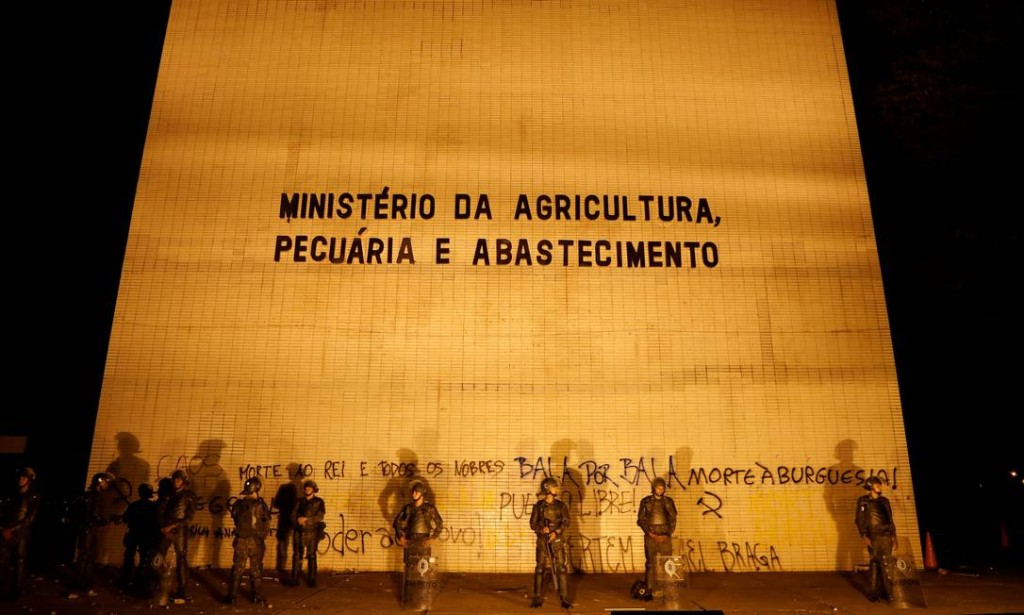by Sonia Corrêa

Since SPW began systematically reporting on abortion politics in Brazil, we have been tracking how these struggles deeply reflected an escalating political crisis. In March 2015, when a group of feminists visited the Supreme Court and the Ministry of Women’s Policies to deliver a petition demanding decriminalization of abortion, political uncertainty was already in full bloom. At that point in time, the newly elected president of the House, Eduardo Cunha (PMDB), was sharpening his claws for a frontal attack on the Workers Party (PT)- led Roussef presidency. This was the initial move in the process culminating in the August 2016 impeachment.
But at the same time, together with his Congress associates, Cunha was frantically pushing a series of regressive legal provisions related to abortion rights. The package included provision PL 5069/ 2013, destined to curtail access to abortion in the case of rape, and two amendments aimed at enshrining within the Constitution the right to life from the moment of conception. One of them was tabled by Cunha himself at the House and the other was presented to the Senate by the Evangelic pastor Senator Magno Malta. This latter proposition would become a Trojan horse.
The subsequent SPW reports (here and here) covered a series of Senate Human Rights Committee Public Hearings on a popular legislative proposal to make abortion legal, which had been presented in 2014 through the congressional cyber platform (e-legislative), and gathered more than 20.000 signatures. Significantly, the processing of this proposition was also led by Senator Malta; the story of how this proposal fell into his lap is illustrative of how the feminist agenda began to be drastically abandoned by parliamentarians as the political terrain began to shift.
When the popular legislative proposal favor of the legalization of abortion gained enough support to be processed, it was put under the cabinet of senator Martha Suplicy who, as a House Representative in the 1990’s, had presented a provision legalizing pregnancy termination. At that time, Suplicy was returning to the Senate after leaving her post as the Minister of Culture in the Roussef administration. By March 2015, however, having shifted positions entirely, she left the PT, joined the PMDB (Cunha’s party), and sent back the provision to the Senate bureau, informing through her staff that she would no longer work on gender issues. Predictably, Senator Malta took it upon himself to manage of the proposal in accordance with his ideological values, while keeping control of the constitutional amendment tabled in 2015.
Since then much water has run under the bridge. By October and November 2015, when the feminist movement took the streets to protest against PL5069, the Zika epidemics erupted; further igniting abortion rights debates (check here). Among other effects, the Zika crisis mobilized the feminist NGO ANIS to present a lawsuit to the Supreme Court demanding respect for the constitutional rights of pregnant women and mothers affected by epidemics, including the possibility of pregnancy termination. The demand was tabled in August 2016, when the impeachment of Dilma Roussef was reaching its conclusion. The unelected Temer administration took over, and its composition of white men in grey suites was subject to extensive critical commentaries within and outside the country (Check here).
From the start, Temer has prioritized the accelerated approval of constitutional reforms on fiscal policy, social security and labor rights, with an eye to appeasing the market. In parallel, the corruption investigation that provoked the original mobilization against Roussef continued, and now began to target pro-impeachment forces. In September 2016, Antonio Palocci, a key PT figure, was arrested, and a month later Eduardo Cunha was imprisoned (which signaled that his amendment on right-to-life from conception would be considered dead).
Meanwhile, the Congressional effort to rapidly enact the package of market pleasing reforms ran in parallel with the discussion and approval of detrimental infra-constitutional legislation and policy guidelines on the most diverse topics, in particular environmental protection and indigenous land rights. Sexual politics was also part of the picture. Last April, the national curricular basis for the public education system was approved, and the final text, while retaining gender language, eliminated all references to sexual orientation and gender identity. This triggered a protest by LGBT activists. Concurrently at the House, language on the right to life form conception was stamped on Constitutional Amendment 58 (tabled in 2011) that proposed changes in the rules regarding maternity leave.
Despite these entirely unfavorable conditions, the struggle for abortion rights had not relented. In November 2016, in a ruling on a criminal case involving health professionals at a clandestine abortion clinic, the Supreme Court made public a substantive decision in which the constitutionality of criminal laws regulating abortion was openly contested and a normative suggestion was made that abortion should be legal until the 12th week of gestation (check here). This groundbreaking commentary had international repercussions and inspired new steps towards ensuring abortion rights in the sphere of the judiciary. In March 2017 the PSOL (Party of Socialism and Freedom) in partnership with ANIS presented a second lawsuit to the Supreme Court now calling for the full decriminalization of abortion.
By then, as the Congress frantically processed the reforms pushed by the executive branch, the streets were once again engulfed by protests against proposed changes in social security and labor rights. Some of these demonstrations were brutally repressed by the police. At the same time, the focus on the PT that had blatantly prevailed in the corruption investigations since 2014 shifted steadily towards politicians who were either members or supporters of the Temer administration. The accusations of corruption that had fueled the impeachment of Dilma Roussef were now turned towards those who made it happen. By late April, Temer’s popularity has dropped to just 9 percent.
This change also implied a major shift in the corruption investigations, away from Petrobrás and the big construction companies where they had begun. The focus was now geared towards other key economic sectors, in particular the gigantic Brazilian meat processor JBS. JBS, after acquiring major competitors in the 2000’s, and with substantial support from the Brazilian National Development Bank, became the world’s largest meat processor. Though its global expansion was due to the administrative investment under the PT, JBS has connections across the political spectrum, including with high levels of the Temer administration, including the president himself.
The last episode of what is now popularly known as the Brazilian ‘house of cards’ aired on May 17th. Late in the day, the Rio newspaper O Globo – speaking on behalf of the powerful Globo media system — reported that Joesley Batista, CEO of JBS, had, in March, taped Temer in a private conversation held at night in the official residence of the president. As reported, the content of the tape implied complicity with corruption and obstruction of justice. By then the CEO was safely in the United States, and the press began a series of rapid reports that JBS had earned large chunks of money with gains in the dollar to real exchange rates that skyrocketed after the revelations of the contents of the tape.

Meanwhile Brazilian politics went up in flames. The taping and revelations involved not only Temer but also other relevant political figures such as Aécio Neves, senator of the PSDB and its current president, who had run against Dilma Roussef in 2014. In the recording, Neves swears extensively and speaks openly about buying politicians and other public officials; even more shockingly, he mentions the possibility of killing a person [before testifying], in case he (or she) were to sign a leniency agreement with the judicial organ involved in the investigation of corruption. His mandate was immediately suspended and he is now the subject of a criminal investigation.
While president Temer contested the content and procedures of the taping, calls for him to resign rapidly multiplied across the political spectrum. The effect of the revelations went so far as to inspire The Guardian to publish an editorial calling the president to be ousted (check here a compilation English written articles on the case and its effects). Calls for direct elections have also flared on the left side of the political spectrum and in society at large, since under current conditions and Constitutional rules, if Temer resigns or is ousted, the Congress would indirectly elect the new president.
This troubling new chapter is not devoid of murky judicial and police investigative details, and it is still very difficult to grasp fully the forces and interests at work beneath the surface of facts sweeping over pages and screens. Most importantly it is clear that the process is far from ending. Despite initial predictions and hopes, Temer is resisting forcefully, though thirteen impeachment proposals have been tabled and part of his congressional basis appears to be abandoning ship. In his quest for survival ministers are falling away and being substituted in a domino effect, and the administration is loosing cadres. [1] The visit of the Brazilian Minister of Foreign Affairs to Washington DC this week is part of this survival strategy, as he plans to state that direct elections are not on the horizon, and that Temer will stay.
Beneath the surface of normalization efforts, glaring fractures are opening between the executive and the judiciary, in particular at the office of the Federal General Prosecutor that is in charge of the JBS investigation and related leniency agreements. Nothing suggests that claims for direct elections will wane, as demonstrated by the protest in Brasilia on May 25th – which was subject to an escalating level of police brutality — or the march in Copacabana on May 28th, which was not properly covered by the mainstream media. No less importantly, there are many indications that the mandarins of the political establishment (from across the spectrum) are now behind closed doors articulating a classical top down solution for the crisis, through an indirect election, in case the groundswell becomes a tsunami.
As this highly volatile and complex political context was building up, PEC 29/2015, the Constitutional amendment on the right to life from conception — tabled by Senator Magno Malta in 2015 and dormant ever since in the Committee on Constitution and Justice — was re-introduced for rapid processing. Last April, a rapporteur was nominated to write an opinion and he very quickly approved its content. In the same week that the Temer- JBS crisis erupted, PEC 29/2015 was sent to the Senate plenary for a vote. On one hand, this ‘unexpected’ Senate dynamic must be read as a political response of the anti-abortion forces to the presentation of ADPF 442 to the Supreme Court, in March 2017. On the other, quite clearly these forces are benefiting from the shadows of a chaotic congressional scenario – where a series on constitutional amendments are being debated and a crumbling executive buys support through all means. In such conditions it will not be so difficult to pass this absurd proposition, which will make Brazil into another Nicaragua.
Since last week, Brazilian feminist organizations have been mobilizing against the amendment. On May 30th, the mainstream press has finally addressed the risks implied by this murky Senate operation (check here in Portuguese). But it is vital that this information is widely circulated internationally. In parallel to the formal Senate processing another cyber consultation (e-legislative) has ben opened to collect positions in favor and against PEC 29/2015. Since yesterday the NO is surpassing the YES voting.
We plea you all to sign against the amendment. Vote NO!
[1] For example, Maria Silvia Marques Bastos, the head of the National development Bank, who was the only woman in a high post of the administration when it took office in 2016.
